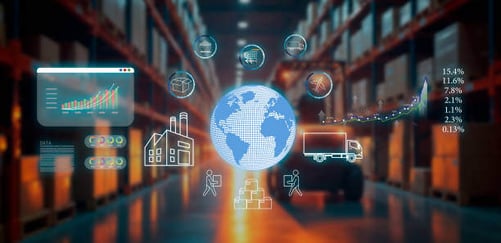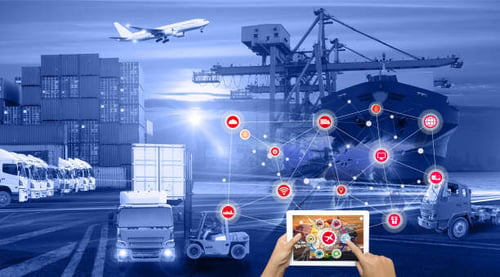Turning Tariffs into Triumphs: Smart Logistics for Food & Beverage Manufacturing
In today’s globalized food and beverage manufacturing industry, tariffs are a formidable challenge. Whether imposed due to trade disputes, economic policies, or regulatory changes, tariffs can significantly increase operational costs, disrupt supply chains, and squeeze profit margins. For Plant Managers, developing a logistical plan that mitigates these impacts is critical for sustaining competitiveness and ensuring business continuity.
Fortunately, advanced supply chain planning solutions—such as PlanetTogether APS—integrated with SAP, Oracle, Microsoft, Kinaxis, or Aveva can provide a strategic advantage. These integrations enable real-time visibility, optimized scheduling, and cost-effective decision-making to navigate tariff-related challenges.

Understanding the Tariff Impact on Food & Beverage Manufacturing
Tariffs on raw materials, ingredients, packaging materials, or finished goods can affect several aspects of food and beverage manufacturing:
Increased Costs: Higher import/export duties inflate procurement costs and, ultimately, product prices.
Supply Chain Disruptions: Vendors affected by tariffs may struggle with delays, impacting production schedules.
Cash Flow Constraints: Additional costs require adjustments to inventory purchasing and supplier contracts.
Regulatory Compliance: Compliance with changing trade policies requires diligent tracking and adaptability.
To counter these challenges, Plant Managers must proactively develop and implement a logistical plan that optimizes supply chain efficiency while minimizing tariff exposure.

The Plan: How PlanetTogether and ERP Integration Helps
1)Diversifying Supplier Base to Reduce Dependence
One of the most effective ways to mitigate tariff impact is supplier diversification. Relying on a single supplier—especially one in a tariff-imposed country—exposes your operations to cost fluctuations and supply risks.
With PlanetTogether APS integrated with SAP, Oracle, Microsoft, Kinaxis, or Aveva, manufacturers can:
Evaluate alternative suppliers by analyzing lead times, quality metrics, and cost implications.
Model different sourcing scenarios and predict the financial impact of changing vendors.
Automatically adjust production schedules based on supplier availability and tariffs, reducing last-minute disruptions.
2)Optimizing Inventory Management and Demand Forecasting
Maintaining optimal inventory levels is crucial in navigating tariff volatility. Overstocking to preempt future tariff increases ties up capital, while understocking can cause production delays.
By integrating PlanetTogether APS with an ERP system, Plant Managers can:
Simulate demand fluctuations and adjust procurement strategies to avoid excessive tariff payments.
Optimize inventory placement by identifying tariff-free trade zones and strategically distributing stock.
Predict future tariff-driven price changes using AI-driven analytics, ensuring cost-efficient purchasing.
3)Reevaluating Production and Distribution Networks
If tariffs significantly impact raw materials, manufacturers should explore nearshoring or reshoring operations. Similarly, identifying regional distribution hubs can lower costs by reducing tariffed border crossings.
Scenario Analysis: PlanetTogether APS helps model the cost-benefit of relocating production to tariff-friendly zones.
Optimized Routing: Integrated with SAP or Oracle, APS can suggest alternative distribution routes with lower tariff exposure.
Regulatory Compliance Tracking: Using ERP data, companies can stay informed about changing regulations and adjust networks accordingly.
4)Enhancing Supplier Collaboration and Contract Flexibility
Collaborating with suppliers to negotiate better terms can help offset tariff costs. Flexible contracts that allow adjustments based on tariff fluctuations ensure mutual resilience.
Real-time Supplier Data: ERP integrations provide live cost comparisons and delivery performance tracking.
Automated Supplier Adjustments: PlanetTogether can auto-adjust schedules based on supplier constraints, minimizing delays.
Multi-Supplier Sourcing Strategies: AI-powered forecasting suggests which suppliers offer the best cost efficiency under new tariff structures.
5)Leveraging Trade Agreements and Tariff Exemptions
Understanding trade agreements, duty drawbacks, and tariff exemptions can unlock cost-saving opportunities. Many free trade agreements (FTAs) offer tariff reductions for qualifying goods.
Automated Trade Classification: ERP systems categorize goods according to regulatory requirements, identifying potential exemptions.
Optimized Customs Documentation: PlanetTogether APS ensures accurate and streamlined documentation to benefit from duty drawbacks.
Customs Workflow Automation: ERP integrations can automate import/export processes, reducing compliance risks.
6)Increasing Supply Chain Resilience with Digital Transformation
A digitally transformed supply chain with AI, machine learning, and predictive analytics offers the agility needed to respond to tariff changes.
Predictive Tariff Impact Analysis: AI models anticipate how tariffs will affect sourcing and production costs.
Automated Decision Support: ERP-driven data provides actionable insights for proactive logistics planning.
End-to-End Visibility: Integrated APS solutions ensure full transparency from raw materials to finished goods distribution.
Creating a logistical plan to beat tariffs is no longer a manual effort—it requires data-driven intelligence, automation, and real-time decision-making. By leveraging PlanetTogether APS with SAP, Oracle, Microsoft, Kinaxis, or Aveva, food and beverage manufacturers can:
Reduce dependency on tariff-heavy suppliers.
Optimize inventory and production planning.
Reconfigure distribution networks to lower costs.
Strengthen supplier collaboration.
Leverage trade agreements for cost savings.
Future-proof operations with digital transformation.
For Plant Managers, the key takeaway is that integrated APS and ERP solutions offer the best tools for mitigating tariff risks and ensuring sustainable, cost-effective manufacturing. With the right strategy, tariffs can become an opportunity for innovation rather than a barrier to growth.
Are you ready to take your manufacturing operations to the next level? Contact us today to learn more about how PlanetTogether can help you achieve your goals and drive success in your industry.
Topics: PlanetTogether Software, Integrating PlanetTogether, Food and Beverage Manufacturing, Diversifying Supplier Base, Optimizing Inventory Management, Contract Flexibility, Reevaluating Production and Distribution Networks, Leveraging Trade Agreements and Tariff Exemptions





















LEAVE A COMMENT